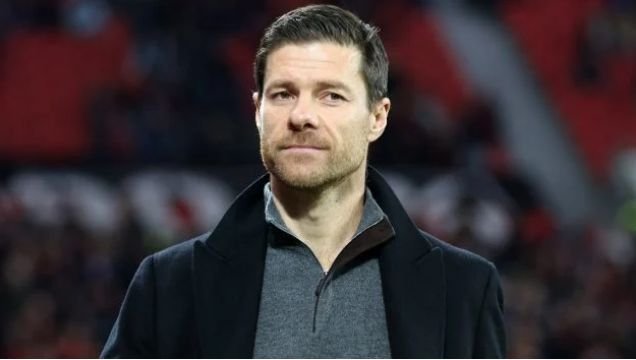Xabi Alonso
Xabi Alonso is synonymous with tactical intelligence and a quiet passion for football. From his early days at Real Sociedad to his emergence as a successful coach at Bayer Leverkusen, he has built a consistent career shaped by precision, discretion, and a unique understanding of the game. His path reflects not just talent but a deep dedication to studying and transforming football from within.

A passion nurtured in Tolosa
Xabi Alonso Olano was born on November 25, 1981, in Tolosa, in the Basque Country, but his relationship with football deepened in San Sebastián. The son of legendary player Periko Alonso, he grew up surrounded by tactical conversations, locker rooms, and worn-out footballs. That early proximity to the sport was never imposed; it was a natural pull. From a young age, he displayed a sharp curiosity for the nuances of the game. He observed, asked questions, memorized formations. He wasn’t just a child dreaming of being a footballer — he was already thinking like one.
That mindset laid the foundation for a career never dependent solely on physical talent. His game was always cerebral, deliberate, strategic. He played more with his vision than with his legs. His goal was never simply to chase the ball, but to anticipate its next destination.
Real Sociedad: the silent forge
Xabi made his professional debut with Real Sociedad in 1999. After a short loan at Eibar, he returned and became the axis of the team. In the 2002–03 season, under coach Raynald Denoueix, the club nearly won the league title, and Alonso established himself as one of the most influential midfielders in Spain. He was just 21 and already captain. That early responsibility shaped his competitive character and quiet leadership.
He wasn’t the shouting type. He led with his eyes, with the order he imposed from the center of the pitch. Early signs of the future coach were already visible.
Liverpool: exporting a unique style
In 2004, he signed with Liverpool, drawn by Rafa Benítez’s project. At Anfield, he found an environment that understood and appreciated his tactical intelligence. His first year culminated in one of the most legendary feats in modern football: the comeback in Istanbul during the Champions League final against AC Milan.
Alonso played a key role in that victory. He scored the third goal to tie the game after his penalty was initially saved by Dida. More than just the goal, he acted as the balance between defense and attack. In Liverpool, he became an icon — a symbol of elegance and class, a midfielder who made complexity look simple.
Real Madrid and the tactical evolution
He returned to Spain in 2009 to join Real Madrid. Under coaches like José Mourinho and Carlo Ancelotti, he became indispensable. He was the one who initiated every attack, held firm in critical moments, and disrupted opposing systems.
He wasn’t known for speed but for his positioning and game reading. He played over 230 matches in five seasons, winning the Copa del Rey, La Liga, and the long-awaited ‘Décima’ Champions League title in 2014. During this time, Alonso also reached his peak with the Spanish national team, contributing to their victories in Euro 2008, the 2010 World Cup, and Euro 2012.
Bayern Munich and global respect
In 2014, at 32 years old, he joined Bayern Munich under Pep Guardiola. The Catalan coach saw him as one of the few players who could fully grasp his football philosophy without lengthy explanations. Alonso started from day one. His style fit naturally into the Bundesliga.
He closed his playing career there with three consecutive league titles and widespread admiration across Europe. In every interview, Guardiola praised his positional sense and panoramic vision of the game. Alonso retired in 2017. There were no grand farewells. He simply said it was the right time. And it was.
From player to coach: the passion continues
After hanging up his boots, Alonso stayed close to the game. He began coaching in Real Madrid’s youth teams, then moved to manage Real Sociedad B. In 2022, he took a bigger step: becoming the head coach of Bayer Leverkusen. In less than two years, he transformed the squad into one of the most tactically admired teams in Europe.
Alonso’s Leverkusen is compact, vertical, and disciplined. The playing style reflects his own past: precision, structure, and intelligence. In the 2024–25 season, he led the team to an undefeated Bundesliga title, ending Bayern’s long reign. His name began circulating for top coaching positions like Real Madrid, but his attitude remained calm — focused on building, not rushing.
Personal life: family and discretion
Off the pitch, Alonso maintains a low profile. He is married to Nagore Aranburu and has three children. He avoids unnecessary exposure and doesn’t see himself as a media figure. His social media is modest, centered on football and life in Germany.
In interviews, he rarely talks about himself. He prefers to speak about the team, about collective effort. That humility is a big part of his appeal.
A life shaped by precision
Xabi Alonso hasn’t lived off football — he has lived for football. His career as a player followed a logical progression based on consistency, study, and a quiet but unshakable passion. Today, as a coach, that same drive becomes daily work, tactical analysis, and a style of play that values collective harmony over individual brilliance.
It’s not about charisma. It’s about coherence. And that’s why those who know him have no doubt — Xabi Alonso’s best chapters are still ahead.
